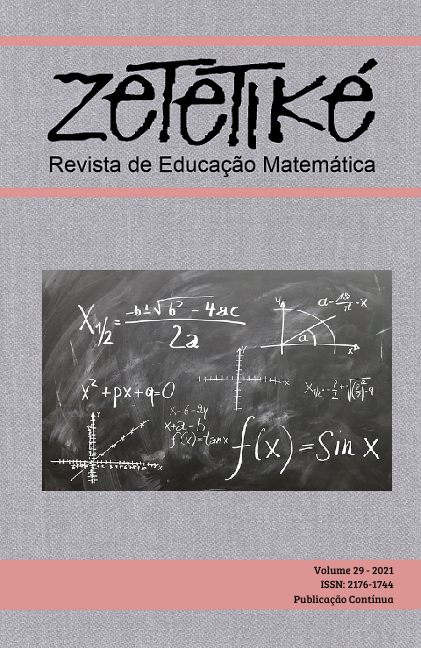Abstract
The article aims to analyze inventive practices of future pedagogues in Mathematics Education through recalling childhood stories with the discipline of Mathematics. As a methodology, we chose cartography, in which proceduralities are problematized during the intervention, prioritizing the descriptive over the interpretive. We elaborated three devices: the production of reports; self exposure; and the sample space. As a result, we note the difficulties facing the discipline, but the desire to build practices that overcome the barriers created throughout life with the area. A responsive look was also raised from the students about future teaching activities, which allowed an opening to the creation of other ways of being a teacher and an inventiveness of mathematical practices. Thus, we consider the emergence of (1) the fear of what mathematics may be in our life; (2) the mathematics we will be working with; (3) the quality of teaching and (4) the use of teaching materials.
References
Curi, E. (2004). Formação de professores polivalentes: uma análise de conhecimento para ensinar matemática e de crenças e atitudes que interferem na constituição desses conhecimentos. Tese de Doutorado em Educação Matemática. São Paulo: Pontifícia Universidade Católica de São Paulo.
D‘Ambrósio, U. (2005). Sociedade, cultura, matemática e seu ensino. Educação e Pesquisa – Revista da Faculdade de Educação da Universidade de São Paulo, 31(1), 99-120. Disponível em: https://www.scielo.br/pdf/ep/v31n1/a08v31n1.pdf.
D‘Ambrosio, B. S., & Lopes, C. E. (2015). Insubordinação criativa: um convite à reinvenção do educador matemático. Bolema, 29(51), 1-17. DOI: https://doi.org/10.1590/1980-4415v29n51a01
Fiorentini, D. (1995). Alguns modos de ver e conceber o ensino da matemática no Brasil. Zetetiké, 3(1), 1-38. Disponível em: https://periodicos.sbu.unicamp.br/ojs/index.php/zetetike/article/view/8646877/15035
Fiorentini, D. (1994). Rumos da pesquisa brasileira em educação matemática: o caso da produção científica em cursos de pós-graduação. Tese de Doutorado em Educação. Campinas: Universidade Estadual de Campinas.
Freire, P. (1987). Pedagogia do oprimido. 17ª. Ed. Rio de Janeiro: Paz e Terra.
Kastrup, V. (2009). O funcionamento da atenção do cartógrafo. In E. Passos, V. Kastrup & L. Escóssia. (Eds). Pistas do método da cartografia: pesquisa intervenção e produção de subjetividade (pp 32-51). Porto Alegre: Sulina.
Knijnik, G. (1996). Exclusão resistência: educação matemática e legitimidade cultural. Porto Alegre: Artes Médicas.
Lacey, H. (2006). Relações entre fatos e valores. Cadernos de Ciências Humanas, 9(2), p. 251-66. Disponível em: http://www.uesc.br/revistas/especiarias/ed16/16_1_relacoes_entre_fato_e_valor.pdf
Larrosa, J. (2002). Literatura, experiência e formação – entrevista com Jorge Larrosa. In M. V. Costa (Ed). Caminhos Investigativos – novos olhares na pesquisa em educação. Porto Alegre: Ed. Meditação.
Lins, R. C. (2004). Matemática, monstros, significados e educação matemática. In M. A. V. Bicudo & M. C. Borba (Eds). Educação Matemática: pesquisa em movimento. São Paulo: Cortez.
Luckesi, C. C. (2014). Avaliação da aprendizagem escolar: estudos e proposições. Cortez editora.
Nacarato, A. M. (2010). A formação matemática das professoras das séries iniciais: a escrita de si como prática de formação. Bolema, 23(37), 905-930. Disponível em: http://www.periodicos.rc.biblioteca.unesp.br/index.php/bolema/article/view/4298
Nacarato, A. M., Mengali, B. L. D. S., & Passos, C. L. B. (2009). A matemática nos anos iniciais do ensino fundamental: tecendo fios do ensinar e do aprender. Belo Horizonte: Autêntica.
Passos, E., Kastrup, V., & Escóssia, L. (Eds). (2009). Pistas do método da cartografia: pesquisa intervenção e produção de subjetividade. Porto Alegre: Sulina.
Passos, E., & Barros, R. B. (2009). A cartografia como método de pesquisa intervenção. In E. Passos, V. Kastrup & Escóssia, L. (Eds). Pistas do método da cartografia: pesquisa intervenção e produção de subjetividade (pp. 17-31). Porto Alegre: Sulina.
Sacristán, J. G. (1999). Poderes instáveis em educação. Porto Alegre: Artes Médicas.

This work is licensed under a Creative Commons Attribution-NonCommercial-NoDerivatives 4.0 International License.
Copyright (c) 2021 Zetetiké


